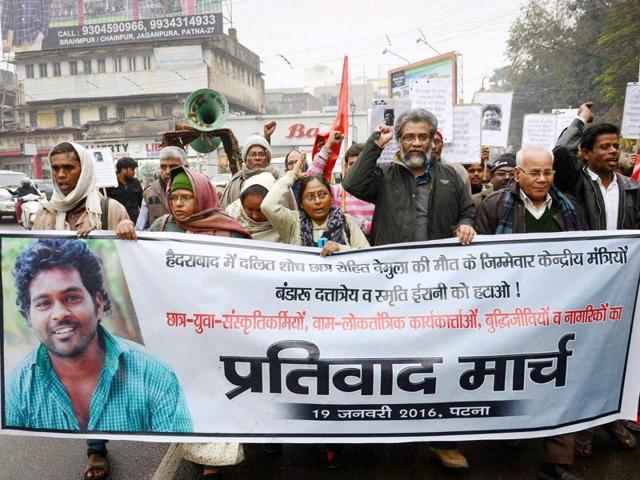If there’s no caste bias, why are Dalit students killing themselves?
The recent incident is a wake-up call for institutions that are still in denial about caste battles that are now being fought on university campuses and pushing Dalit students over the edge.
Rohith Vemula dreamed of becoming a science writer like Carl Sagan and dreaded becoming a mere statistic. In the end, when he finally strung the noose around his neck on January 17, he became just that: another number.

There are at least 18 documented cases of Dalit student deaths across India due to caste discrimination. In 2008, Jaspreet Singh, a 21-year-old MBBS student at the Government Medical College in Chandigarh, killed himself in his college library after facing discrimination from his mentor and fellow students. The suicide note recovered from his pocket blamed the head of the department for deliberately failing him in an exam. His answer sheet was re-evaluated. This time, he cleared the examination but life had failed him by then.
The University of Hyderabad where Vemula took his own life less than a week back has seen at least six Dalit student suicides since 2008 and around 12 since the varsity came into existence in the 1970s, according to the Ambedkar Students Association (ASA). University PRO Ashish Jacob Thomas, however, said “there is no readily available data on this.”
“The last case was that of Madari Venkatesh in 2013. He had not been provided a research guide and lab for seven months. He finally consumed poison,” said Suman Damera, a student of the same university.
In 2007, the Thorat Committee — set up to probe the treatment meted to SC/ST students at the All India Institute of Medical Sciences — found that discrimination was rampant. If the least bit of attention had been paid to the committee’s recommendations, Balmukund Bharti, a final year MBBS student, might not have hanged himself in his hostel room three years later.
Dr Ajay, a former AIIMS student who now heads the Progressive Medicos Forum — that looks into issues of caste discrimination is north India’s medical colleges, said, “Bharti told his parents ‘my teachers tell me I will never become a doctor’.”
His parents’ painful testimony is part of a documentary, titled Death of Merit, in which they accuse the premier institution of “caste discrimination that drove our son to commit suicide”. They demanded a probe that the AIIMS administration never conducted, citing “personal reasons” as the reason for Bharti’s suicide.
Vemula was another meritorious and articulate student and an active member of the ASA. Anant Maringanti, director, Hyderabad Urban Lab — a research centre that mentors students, said, “The reasons for his death should be sought in the existential crisis faced by thousands of students from underprivileged families who choose politics to grapple with their social experience.”
Dr Ajay said Vemula and the other four suspended students of the ASA were targeted because they were radical and Dalit. Vemula had raised issues of saffronisation of educational policies and social ostracisation.
“The ASA backed other progressive groups which hit the supporter base of the ABVP on campus in the past four years,” said Damera, adding, “They were out to get people like Vemula and portray them as extremists for protesting Yakub Memon’s execution when it was not about Memon at all but about taking a stand against capital punishment.”
The recent incident is a wake-up call for institutions that are still in denial about caste battles that are now being fought on university campuses and pushing Dalit students over the edge. The question educational institutes now need to ask themselves is: If academic spaces are inclusive, welcoming and empowering, as they claim to be, then why are young Dalit students killing themselves?
(Inputs: Tanbir Dhaliwal/Chandigarh, Prasad Nichenametla/Hyderabad)





